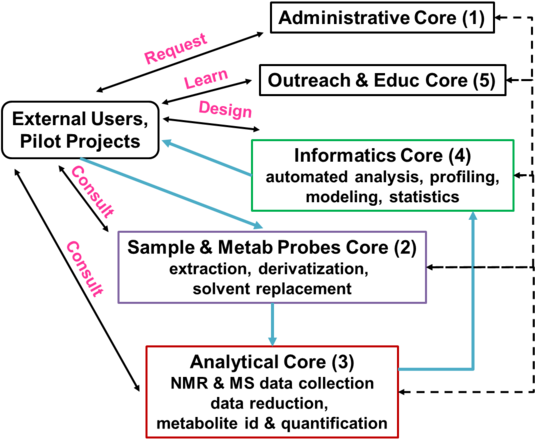You are here: Moseley Bioinformatics Lab>RCSIRM Web>AdministrativeCore (31 Oct 2017, AndrewLane)
Administrative Core
Organization
- Administrative Core
- Headed by Dr. Richard Higashi
- Sample Processing Core
- Headed by Dr. Teresa Fan
- Analytical Core
- Headed by Dr. Andrew Lane
- Informatics Core
- Headed by Dr. Hunter Moseley
- Outreach and Education Core
- Headed by Dr. Teresa Fan
Client Interactions
Clients and P&F Projects will have interactions with each Core as is needed, starting with requests made to the Administrative Core. These interactions will be guided by the Program Coordinator and each head of a Core, according to the Services available in the Center.
 *The Center has several levels of interaction with Clients, as follows: *
*The Center has several levels of interaction with Clients, as follows: *
- The Center specializes in stable isotope tracer studies of metabolism and such studies are given priority over metabolic profiling.
- There are two models of operation, fee-for-service, and collaboration.
- The collaborative model involves substantial input from Center personnel both at the experimental design stage and data interpretation with the expectation of co-authorship.
- The fee-for-service model involves only data collection and raw processing.
- In both models, any outcomes (publications, grants) the Center must be acknowledged, and notification of outcomes is required.
- Requests for support letters for grant proposals should be made through the Administrative Core
 *The Center has several levels of interaction with Clients, as follows: *
*The Center has several levels of interaction with Clients, as follows: * - Basic Analytical Services
- The Client will supply raw tissue/cells/media with a request for sample processing with NMR and/or MS analyses
- OR the Clients supply metabolite extracts with a request for standard NMR and/or MS analyses.
- Then the Center prepares the extracts accordingly, records the appropriate spectra under standard operating conditions, and returns the raw data to the Client
- OR the Center prepares the extracts accordingly, records the appropriate spectra under standard operating conditions, and reduces the data to a list of quantified identified metabolites with respect to the current databases, with isotopomer and isotopologue distributions when appropriate.
- The Client will supply raw tissue/cells/media with a request for sample processing with NMR and/or MS analyses
- Experimental Design
- The Client consults with the Center leadership on the overall goals to develop a detailed plan for the experimental design, numbers of samples, sample handling and integrity, numbers of analytes and analytical platforms, number and types of tracers to be used.
- Biostatistical Analysis
- The Center will assist in recommending various biostatistical analyses for metabolic profiling and sample classification.
- Assistance, beyond rudimentary guidance, will require collaboration.
- The Center will assist in recommending various biostatistical analyses for metabolic profiling and sample classification.
- Guidance on Mechanism-Based Analysis and Omics Integration
- The Center will assist in mechanism-based biochemical interpretation, which includes relevant metabolic pathway analysis and integration of metabolic data with other streams of information such as transcriptomics, proteomics, and functional annotations.
- Assistance, beyond rudimentary guidance, will require collaboration.
- The Center will assist in mechanism-based biochemical interpretation, which includes relevant metabolic pathway analysis and integration of metabolic data with other streams of information such as transcriptomics, proteomics, and functional annotations.
- Custom Services
- The Center will collaborate with Clients to develop new methods and standard operating procedures that address their specific needs.
- In vivo NMR experiments (e.g. preclinical mouse model studies) will always be under this category.
- Custom Services will usually incur the highest rates, and will require collaboration where new methods or assays are developed.
Steering Committee
The Steering Committee assesses project progress and is responsible for prioritization and any conflict resolution, in consultation with the Clients.
- Dr. Richard Higashi - Chair
- Dr. Teresa Fan
- Dr. Andrew Lane
- Dr. Hunter Moseley
Topic revision: r9 - 31 Oct 2017, AndrewLane
 Copyright © by the contributing authors. All material on this collaboration platform is the property of the contributing authors.
Copyright © by the contributing authors. All material on this collaboration platform is the property of the contributing authors. Ideas, requests, problems regarding Moseley Bioinformatics Lab? Send feedback
